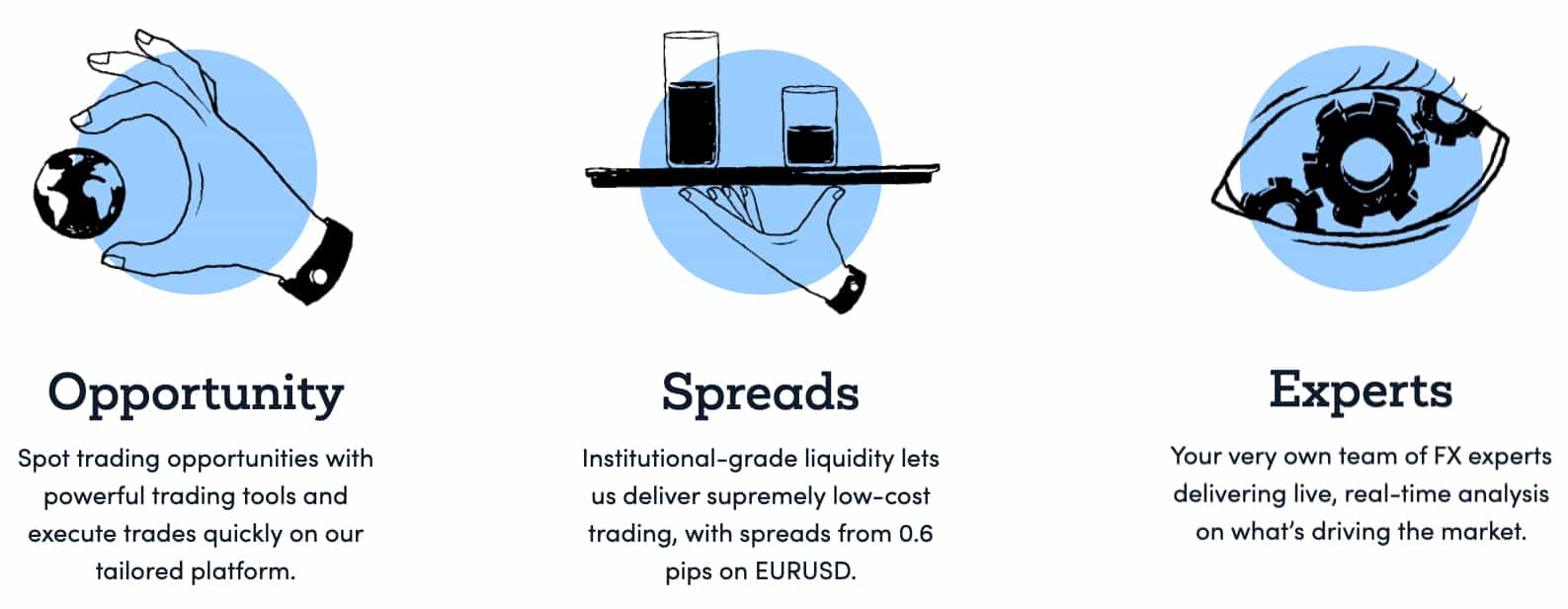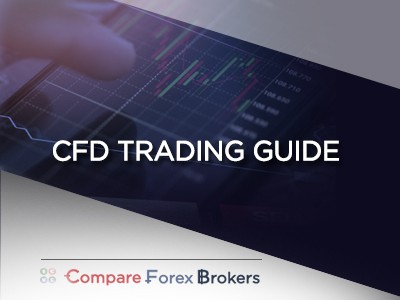CFD Trading Guide
A CFD (contract for difference) is the most common method of derivatives trading with over 10,000 markets ranging from US and AU stock CFDs, indices to currency trading with CFD brokers offering leverage up to 30:1 (ASIC) and 500:1 (offshore) across a range of CFD trading platforms from MT4 to cTrader.
Written by Justin Grossbard
Updated:
- 67 Forex Brokers reviewed by our expert team (See our top 10 picks)
- 50+ years combined forex trading experience
- 14,000+ hours comparing brokers in the past 12 months
- Structured and in-depth evaluation framework (Our Methodology)
Our broker reviews are reader supported and we may receive payment when you click on a partner site. For more information, visit our About Us page.
Understanding CFD Trading
Trading CFDs means you don’t need to have any own underlying assets you trade. Instead of trading the underlying instrument, CFDs work by allowing you to take a short position that speculates that the underlying asset will fall or a long position that it will rise. It’s important prior CFD trading that an individual understands:
- What CFD broker suits their needs
- Types of CFDs and financial markets
- The difference between OTC vs Exchange Traded CFDs
- Regulation around CFD trading for retail investor accounts
- The history of CFDs
Below goes through these five contracts for different areas.
Choosing a CFD Broker
Three types of CFD brokers suit different CFD trading styles. Below will go through each broker grouping, identifying some of the best CFD brokers and their pricing structures. CFDs are leveraged trading products, and each asset class and financial jurisdiction have different leverage limits.
1) CFD Specialist High Leverage Brokers
There are a plethora of offshore contracts for different brokers that focus on forex trading. Although not regulated by a tier-1 financial authority like ASIC or the FCA, these brokers offer leverage of up to 500:1. This means that you can trade up to 500 times the deposit made. Price movements of just 0.2% with this leverage will mean either doubling or losing the whole trade. This high volatility is why traders need to understand the risks of leverage before trading and may want to request lower levels.
Key Benefits
- The brokers are Market Maker leading to the lowest brokerage (tight spreads and commissions)
- The choice of using the most popular trading instruments, including the MT4 trading platform
- Modest margin requirements ideal for automated trading
Downsides
- The high risk from leverage combined with a lack of risk management tools
- No option to trade other financial products such as stockbroker services
- The need for some trading experience to understand the CFD trading fundamentals
- ASIC does not allow leverage over 30:1, so if you are trading with 500:1 leverage, it is with an offshore subsidiary of a broker.
In Australia (ASIC) and Europe (CySEC) the financial authorities enforce leverage caps on the following CFD asset classes:
- Major forex pairs 30:1
- Minor fx pairs, Gold and major indices 20:1
- Other commodities and minor indices 10:1
- Stocks (aka shares) 5:1
- Cryptocurrencies 2:1
In the UK, the Financial Conduct Authority (FCA) imposes the same leverage caps, except cryptocurrency trading is banned altogether for retail investor accounts.
The Best CFD Specialist Broker
Markets.com is one of the best CFD brokers worldwide based on its tight spreads, wide market access, and top trading platforms. As a market maker broker, all spreads are commission-free and as low as 0.6 pips for major currency pairs like the EUR/USD. After signing up to Markets.com, you can trade over 2,200 different CFDs derived from eight asset classes (forex, indices, commodities, shares, ETFs, cryptocurrencies, bonds and blends).
The broker offers three trading platforms to choose from, each with a selection of unique trading tools ranging from sentiment data to algorithmic trading capabilities. If you want to automate trading, trading robots (Expert Advisors) can be developed on both MetaTrader 4 and MetaTrader 5. If a diverse collection of sentiment, technical and fundamental analysis tools are preferred, Markets.com offers its proprietary trading platform.
The broker offers free demo accounts for those wanting to explore the trading platforms before opening a live account. Free demos allow you to practise leveraged trading in real financial markets, but with no risk.
To learn more about Markets.com or sign up for a free demo account, you can check out our Markets.com Review.

2) New To CFD Brokers With Risk Management
Only a few brokers are specifically designed for those new to CFD trading due to the limited profitability of these individuals. While these brokers may still offer leverage, it’s matched with advanced risk management tools. Some of these need to be activated when making a trade, while others are standard for all traders.
Key Benefits
- Negative balance protection ensures a trader can’t lose more than their deposit
- Advanced risk management features include guaranteed stops to set maximum losses on trades
- Low initial deposit requirements and margin call requirements.
Downsides
- These brokers have the highest brokerage in terms of spreads and fees for premium features
- A lack of CFD trading platform choice with often the requirement made to use the broker’s propriety platform
- Poor range of CFD markets with a limited choice of markets and products
The Best New To CFDs Brokers
EasyMarkets is the best CFD account for those new to CFD trading. They have a unique feature called Deal Cancellation that when activated allows a trader to exit a trade within 60 minutes, avoiding a potential loss on a trade. They also offer Negative Balance Protection and guaranteed stop-loss orders matched with outstanding customer service. You can view the 2019 easyMarkets Review where these features of this Sydney-based broker are discussed further.

3) Range Of Markets CFD Brokers Including Stockbroking
The largest CFD trading broker offers financial instruments such as stockbroking on global markets. This means an individual can buy and sell shares and then trade CFDs, forex and indices with the same broker. In some cases, they can even trade global markets with the same CFD trading platform. They allow multiple open positions with a modest trade size to suit multiple CFD trading strategies with a modest initial margin.
Key Benefits
- The range of markets across both CFD trading and stockbroking
- Access to market-leading research and trading tools across global markets
- A large choice of trading platforms based on an individual’s requirements
Downsides
- Spreads and commissions are higher than CFD specialist brokers
- Lower leverage than another broker
- Only a limited number of risk management tools
The Best All-In-One CFD Brokers
The two largest brokers that offer CFDs and stockbroking services are IG (based out of Melbourne) and CMC Markets (based out of Sydney). You can view the CMC Markets vs IG comparison table to make your choice based on financial instrument information, global markets offered, brokerage and customer service. Another broker that provides a range of CFD services is Plus500.

Summary Of The Best CFD Broker For You
A range of lists based on regulation has been created from the Best Forex Brokers In Australia to the Best Forex Brokers in UK. EasyMarkets is ideal for those new to CFD trading, while CMC Markets ideal for those looking to combine a stockbroker with a CFD trading firm. These three companies allow a trader to choose their base currency (normally the AUD) and open a demo account. This means they can start trading with simulated funds to become familiar with the trading platform and CFD markets traded. You should always consider your financial situation before finalising your CFD account choice.
Types of CFDs Available For Trading
CFD instruments are incredibly diverse and span a wide range of asset types including the forex market. There are CFD and forex brokers that allow shares, currency, commodities and treasury notes to be traded. The overall benefit of being able to trade CFD derivatives in these markets is that it reduces the confusion or complexity of trading. Trading costs and Forex Fees are also lower and the access it provides retail traders is unbelievable considering historically, a number of these derivatives were only ever offered to institutional firms.
The types of CFDs online brokers may offer include
- Global Stocks/Share CFDs – the most commonly traded CFDs
- Stock Index – i.e. FTE, NIKKEI, NASDAQ, Dow.
- Industry Sector – i.e. Banks or Technology
- Foreign Exchange – i.e. GBP/NZD
- Exchange-traded funds (ETFs)
- Soft Commodities – i.e. Agricultural Products such as Coffee, Sugar, Wheat, Corn, Soybeans or Live Stock such as Pork, Cattle)
- Hard Commodities – i.e. Metals (Gold, Silver, Copper) and Energy (Gas, Oil, Uranium).
- Cryptocurrencies – i.e. Bitcoin. Note: Cryptocurrency CFD trading is no longer available to UK traders due to changes to FCA regulations.

OTC CFDs VS Exchange Traded CFDs
Many people ask what the benefits of trading CFDs on exchange versus over the counter are. While there are some downsides, exchanged traded CFDs far outweigh CFD trading over the counter. To begin with, CFDs traded on an exchange are strictly regulated, meaning they are much fairer and all activity is completely transparent.
Counter-party risk, which is an assessment of how prone a counter-party to a contract is to insolvency or default, is also kept to a minimum when an exchange is factored in. On the other hand, CFD trading on a regular exchange incurs a bit of a premium due to the aforementioned advantages. Furthermore, there is only a finite number offered on international and Australian markets, which also causes prices to spike.
Spread Betting vs CFD Trading
Those based in the UK or Ireland trading with an fx broker regulated by the Financial Conduct Authority (FCA) also have the option of spread betting as an alternate to CFD trading.
Similarly to CFD trading, spread betting is a derivative trading opportunity, where you are not buying or short selling the underlying instrument, rather you are speculating on whether the market price (buy and sell prices) will increase or decrease.
When CFD trading, your profit is the difference in the spread between the opening price and the closing price. When spread betting, your gains equate to the stake you have betted per each price move.
The major difference between spread betting and CFD trading is how profits are taxed in the UK. Any profits made from CFD trading are subject to Capital Gains Tax (CGT) and exempt from stamp duty, while spread betting is exempt from both Capital Gains Tax and stamp duty.
Is CFDs Trading Legal In All Jurisdictions?
You’ll often find that CFD trading is legal in most marketplaces, where they are regulated. However, CFDs are not legal in all countries with the USA at the top of the list of countries where CFDs trading is not endorsed or regulated. In the United Kingdom, CFDs are regulated by the Financial Conduct Authority (FCA, formally the Financial Services Authority, FSA). The FCA is stricter than most financial authorities and, as of 2009, require greater disclosure obligations to avoid insider trading. Recently, the FCA banned all retail traders within their jurisdiction from trading crypto CFDs. Europe has its own regulators, such as CySEC (Cyprus) and BaFin (Germany).
Like the UK, CFD trading is also very popular and is regulated rigorously by the Australian regulator, ASIC (Australian Securities and Investments Commission). Some other countries that boast CFDs trading include Austria, Canada, France, Israel, Germany, Japan and South Africa just to name a few.
It’s important to read the product disclosure statement of the CFD provider you choose to make sure trading is available for your region. This includes looking at the exact CFD trading account financial services guide, ensuring the type of trading meets regulation.
Can I Access Foreign Share Markets With CFDs?
This is perhaps one of the greatest benefits of CFD trading in Australia. Ever had a conversation with your friends about wanting to purchase stocks overseas? The biggest companies in the world operate out of the United States. Dreamt of taking advantage of the returns shares in Apple, Google or even Facebook offer? Typically, it has been quite costly and almost impossible to purchase foreign equities. However, CFDs makes it possible even when you don’t have direct foreign market access.
In Australia, if you wanted to acquire US shares in your trading portfolio, you could expect to pay close to $50 per trade, making it a lot more expensive compared to trading with Australian shares. You’ll also only be able to purchase shares in a select number of US companies. With CFDs, the share trading of American stocks is available to you at the touch of a button via the broker’s CFD platform.
A History of CFD Trading

The founder of CFDs trading is debated heavily, and to this day people cannot agree on who created this popular derivative. What people do agree on, however, is that CFDs originated in London in the early 90s. It is widely held that a financial services firm came up with the concept as a way to hedge or offset their risk from shares traded on the London Stock Exchange. CFD popularity was because they didn’t require a large margin, no actual shares were changed hands and those dabbling in the instrument were able to avoid taxes such as capital gains. It wasn’t until the late 90s and the dot com boom’s dramatic rise in online trading that CFDs began to be traded by retail traders as an investment tool. It is no coincidence that the ease of trading brought about by the internet coincided with the dramatic growth of CFD trading, especially in Australia.
When Did CFD Trading Start?
Similar to other fads and technologies which take some time to arrive on Australian shores, CFD trading Australia didn’t commence until roughly 2002. Australia’s addiction to trading meant CFDs were perfect for the Aussie market, and in just a short space of time the CFD trading Australia market grew to nearly 50,000 active traders. Just five years later in 2007, Australia was the first country in the world to offer exchange tradable CFDs. Typically CFDs are OTC or over the counter, meaning you trade directly with a counter-party with one winner and one loser ensuing.

A Summary of CFD Trading Australia
This article has gone through a brief but interesting history of CFDs. CFDs differ greatly by region, broker and especially by the level of regulation. Smart CFD traders will ensure they use a CFD broker regulated by the English Financial Conduct Authority (FCA) and the Australian Securities and Investments Commission (ASIC) as these are considered the strictest of regulators meaning your investment is better protected and explains why CFDs speculation in the UK and Australia is especially popular.
It is easy to get sucked into the hype surrounding CFDs considering their immense popularity. Many people also think that just because trading online at the touch of a button is easy, successful CFD speculation is simple too. This is a big misconception and one the team at Compare Forex Brokers has tried to dispel for a long time.
Trading any derivative or financial products from CFD to Options carries immense risk, especially with offshore brokers, as these products are traded with High Leverage Forex Brokers. The most important thing is to know your limits. Don’t risk all the money in your trading account, especially if you’re not a completely confident trader, further, it is always important to seek independent advice to calculate the risk involved.
This is especially true for leveraged products, meaning you are trading with cash more than your deposited amount. CFDs are highly beneficial but with anything, background knowledge and practice over time are critical for CFD trading success. View our review of the best Forex Trading Courses to help you with your trading.

Justin Grossbard
Having traded since 1998, Justin is the CEO and Co-Founded CompareForexBrokers in 2004. Justin has published over 100 finance articles from Forbes, Kiplinger to Finance Magnates. He has a Masters and Commerce degree and has an active role in the fintech community. He has also published a book in 2023 on on investing and trading.



Ask an Expert